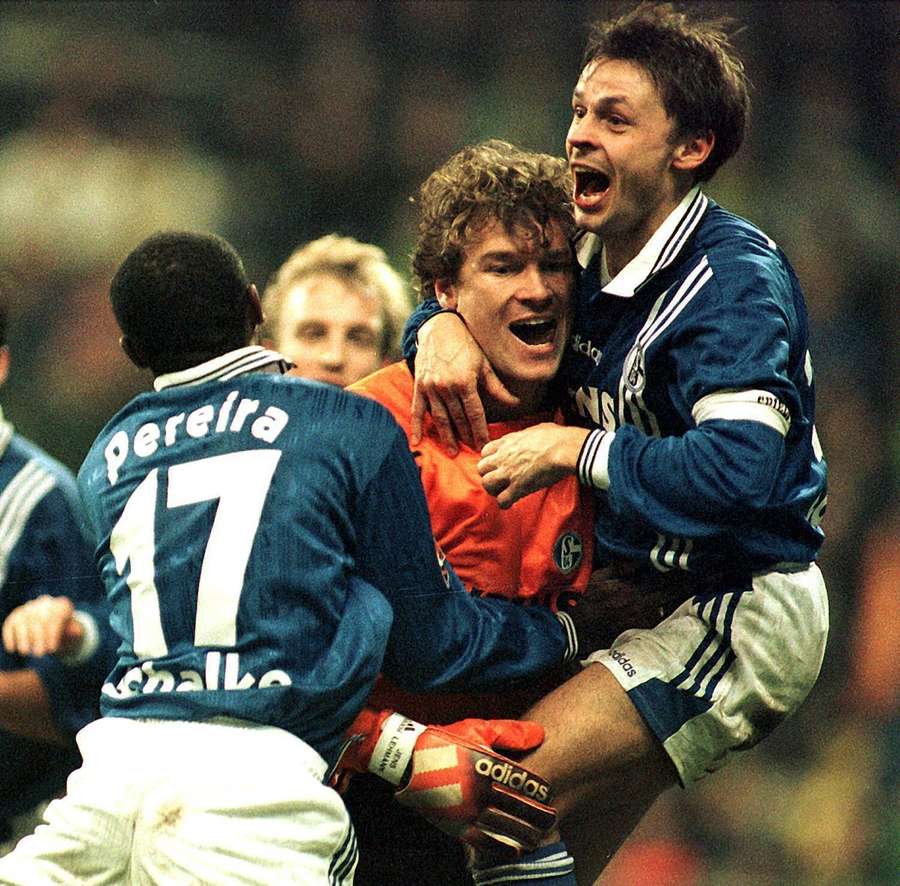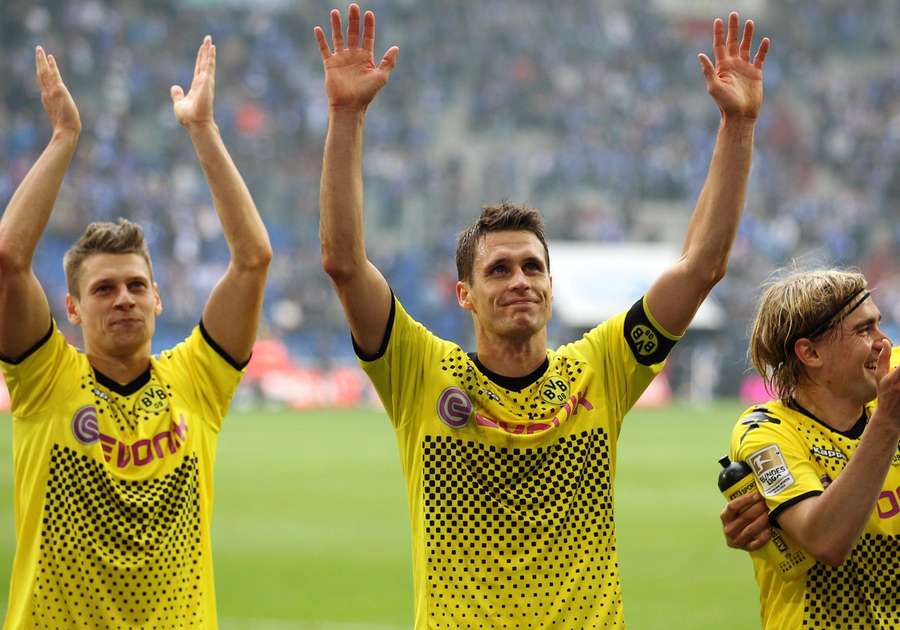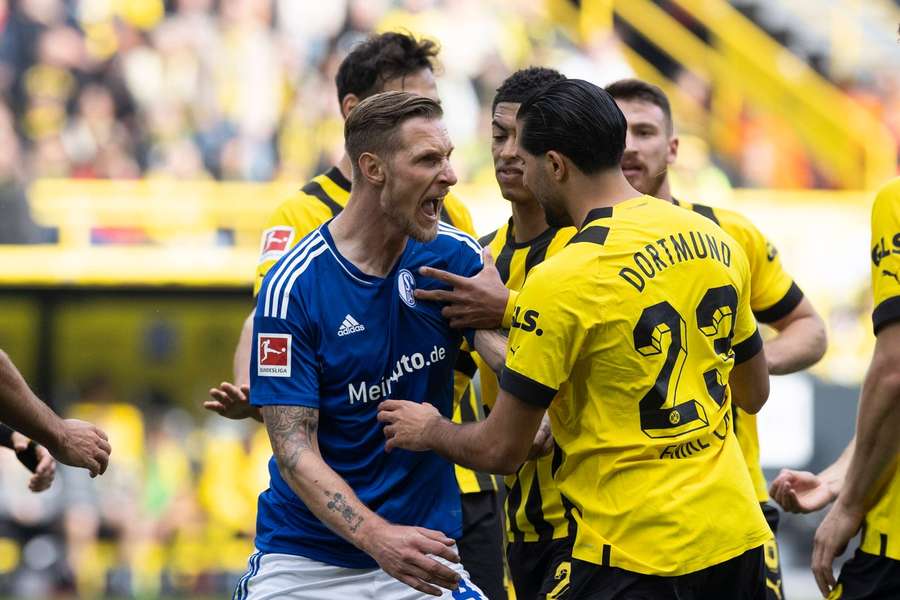September 6th 1969: Sheepdog in a blood frenzy
Dogs that bite don't cause games to be abandoned. But they do cause a lot of confusion and will remain in Bundesliga folklore for decades.
It has never been completely clarified what the name of the German shepherd dog was that bit Friedel Rausch on the behind in 1969. The sources disagree on whether it was "Rex" or "Blitz". What is clear, however, is that the furry nose wrote a piece of Bundesliga history. And Friedel Rausch, who died in 2017 in his adopted home in Switzerland, became famous far beyond the end of his career.
It was the fourth Bundesliga matchday that season. There was an immense crowd at the Rote Erde stadium in Dortmund. More than 39,000 fans had made a pilgrimage to the sports field. The stadium was packed, the spectators pushed almost to the sidelines, and there was a massive police presence.
A dog squad was also present. When Hans Pirkner gave the visitors the lead in the 37th minute the royal blue fans knew no stopping. They stormed onto the pitch, hugged their players - and the police immediately tried to break up the commotion.
Not an easy undertaking. A wild dog made everything worse and bit Rausch. According to reports, a Dortmund steward smuggled him into the stadium and later let him off the leash. In the anniversary book, "40 Years of the Bundesliga", the Schalke defensive legend recalled: "Huge excitement. My trousers were soaked with blood. All I heard were voices. 'Hold the dog'. I was carried off the pitch. The pain was beastly."
Substitutions were not allowed at that time and no one wanted to know about stopping the game. Rausch was given a tetanus shot and then had to return to the pitch. Later he received 500 marks in compensation, and a bouquet of flowers from Dortmund as an apology. The Bundesliga made it compulsory to muzzle him.
Different times, different customs. What would be a huge scandal today became a fondly told anecdote back then. Rausch could not expect any empathetic words from his teammates. In response to the statement, "Hey, Friedel, be happy! Imagine if he had bitten you in front...", Rausch is said to have replied: "Then the mutt would have lost his teeth."
The game ended 1-1, Borussia finished the season in fifth place, Schalke in ninth.
December 19th 1997: Jens Lehmann equalises
Anyone who longs for so-called characters also longs a little for Jens Lehmann. His pee break in 2009, when he briefly disappeared behind the boards in Stuttgart stadium in the middle of the game, stuck in the collective memory just as much as the moon landing or the fall of the Berlin Wall. Lehmann was always good for anecdotes worth telling. But Lehmann was also an outstanding goalkeeper. He proved it to the whole world during the 2006 summer fairytale.
He began his professional career with Schalke, where he played as a centre forward for a long time at his home club Schwarz-Weiss Essen before finally taking over the role of goalkeeper in Gelsenkirchen.
He was extremely successful: from the 1994/95 season onwards he established himself as an undisputed regular, in 1995/96 he organised the strongest defence in the entire league with only 36 goals conceded, and in 1996/97 he won the UEFA Cup together with the growler from Kerkrade - the legendary Huub Stevens.
However, many royal blue fans hardly forgave Lehmann for his four-year engagement with their arch-rivals. Between 1999 and 2003, he played for Dortmund - in front of the very black and yellow fans he had stabbed in the heart a few years earlier. On 19 December 1997, he scored an equaliser in injury time during a 2-2 draw.
After a corner kick, the ball landed directly in front of Lehmann's head. He did not hesitate for a second and put the ball into the net. The Dortmund players claimed offside, but it was no use: Schalke remained the secret winner in a fiercely contested duel.
The then 28-year-old commented laconically: "When I concede two goals, I always have a guilty conscience. At least I also scored one."

The legendary Schalke manager Rudi Assauer is said to have complained to Lehmann after the end of the game: "You scored three goals today, Jens."
After all, his much-celebrated equaliser had been preceded by two blunders that had made Dortmund's lead possible in the first place.
April 14th 2012: Dortmund pass the test
There was a particularly heated atmosphere before the derby in April 2012. Unknown perpetrators had smashed the windscreen of the Schalke team bus in the run-up to the match. At lunchtime, there were clashes and hooded Schalkers attacked a group of Dortmund fans. The security forces had to intervene. The black-and-yellow fan entrance had been stained with a "red liquid", as the police report put it - presumably pig's blood.
All in all, the police in Gelsenkirchen stated after Borussia's 2-1 victory, everything had been quite "unspectacular" in view of "the special circumstances" at a district derby.
The 31st matchday in 2011/12 was of immense importance for Dortmund. If they left the Veltins-Arena with three points, the second championship title in a row would be practically certain. However, a win at Schalke was a big challenge at the time: the starting XI for the royal blue team included players like Jefferson Farfan, Raul and Klaas-Jan Huntelaar. After Dortmund and Bayern, they were in a commanding third place. Cannon fodder looks different.
The game unfolded accordingly. Farfan quickly gave the home team the lead with a smart finish into the far corner.
Lukasz Piszczek equalised eight minutes later with a dream goal. After a corner kick, the ball came via Jakub Blaszczykowski to Piszczek, who shot from an acute angle - and let Dortmund grab the championship trophy with one hand. After the leveller, the match developed in the same way as district derbies do: many fierce duels, an intense scramble for the second balls. Referee Grafe, however, managed with relatively few yellow cards (four).

After the change of ends, Schalke ignited the turbo, Huntelaar found two top-class chances. Again and again, Christian Fuchs looked for the "Hunter" with his pinpoint crosses. In the 47th minute, the ball whizzed just past his forehead. Eight minutes later, he had broken away well from Hummels, but shot the ball clear across the box from close range.
Sebastian Kehl did better on the opposite side despite his lack of striker genes. After a corner kick, Metzelder badly misjudged and the now BVB sporting director only had to push the ball behind the line. Kehl had only been substituted at half-time.
BVB managed to hold on to the close result, winning 2-1 and had an eight-point lead over Bayern Munich with three match days to go. In the derby, of all places, they had laid the foundation for a commanding title win.
November 25th 2017: Schalke and the 4-4 'victory'
From today's perspective, it's not so easy to imagine: in the 2017/18 season, Schalke was the second-best team in the league, while Dortmund lagged miles behind its own high standards.
Under Domenico Tedesco, the Konigsblauen had allowed themselves to be moulded into a top team. Naldo, who came from Wolfsburg, kept things together at the back. Max Meyer has been convincing of late as a playful six, and his sidekick Leon Goretzka has made the leap to world-class player.
Bastian Oczipka ran the left side with incredible zeal. Newcomers Amine Harit and Nabil Bentaleb also seemed well integrated. Up front, Guido Burgstaller scored goal after goal.
The picture was different at BVB. Peter Bosz could not implement his system, which had been tremendously successful at Ajax, on the team. The defensive chain was often positioned in the opponent's half. Accordingly, it was easy for all opponents to overcome it with balls over the top.
Before the Revierderby, the team had failed to win five games in a row. They had suffered embarrassing, unnecessary defeats against Hannover and Stuttgart. They had also lost the top games against Bayern and Tottenham in the Champions League without a chance.
The momentum was clearly on the side of the Knappen. So it was all the more surprising that BVB set off real fireworks from the start in the sold out Signal Iduna Park.
Pierre-Emerick Aubameyang made it 1-0 in the 12th minute, and Benjamin Stambouli scored an own goal six minutes later. Mario Gotze would add to the tally in the 20th minute and Raphael Guerreiro would also score five minutes later. After 25 minutes, Borussia was four goals ahead. Such a clear lead after so little playing time - that had never happened before in a Revierderby.
Bosz had opted for a 3-4-3 formation. The surprise seemed to have succeeded, the tactical trick had worked. He went into the dressing room with the feeling that he would soon be vindicated. But when Deniz Aytekin blew the final whistle, he was considered a failure, a coach on call. Less than a month later, the Dutchman would be sacked.
Tedesco had found the right words in the dressing room. Goretzka explained: "In moments like this, there are two options: Stand up to the team or try to make it clear to the players that you can only learn from a first half like that."
The Schalke coach, who was only 32 at the time, chose the second option and he was successful with it.
Yet Tedesco himself did not believe in a possible miracle: "We wanted to win the second half, it was less about the amount." The then sporting director Christian Heidel had also already lost faith: "After half an hour I wished the referee would please blow the whistle."
Guido Burgstaller got things started with a header on the hour mark - the consolation goal. Harit followed up in four minutes later - a sign of life.
Aubameyang was sent off in the 72nd minute with a yellow card. The atmosphere in the stands began to crackle. Was there something in the air?
Four minutes before the end of normal time, when Daniel Caligiuri added to the score with a powerful left-footed shot, suddenly everything seemed possible. The stadium was electrified, hardly anyone could keep their seats. And when Naldo was on hand in the last minute of stoppage time to score the equaliser from a corner kick - there was no end to the royal blue ecstasy.
Domenico Tedesco ran onto the pitch. The otherwise dry-looking German-Italian had rarely been seen so euphoric. Dortmund was devastated. At the end of the season, Schalke would become the runners-up with a commanding eight-point lead over Hoffenheim. Dortmund ended a difficult season in fourth place.




